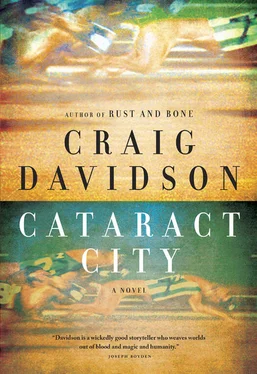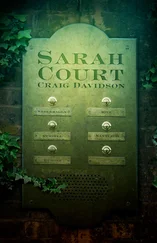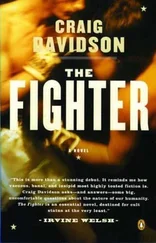My breath hitched. I felt my heart as a discrete part of me, shuddering in my chest. I couldn’t speak; my voice was lodged tight and hard as a fist somewhere below my lungs.
“Duncan?”
After an endless gulf during which I was certain she’d hang up, I squeaked, “Yes.”
A pause, then a long exhale. “So,” she said, “are you going to try to find me?”
“Depends,” I answered. “Do you want to be found?”
She laughed — a husky, frayed-edge sound. The most beautiful sound in the whole world.
PART FOUR. DONNYBROOK & LIONS IN WINTER DONNYBROOK: DUNCAN DIGGS
That first night in the Kingston Pen I lay in the dark above my new cellmate, a huge specimen from Sioux Lookout named Nathan Bainbridge. Bainbridge gave off a billygoat odour: trans-3-methyl-2-hexenoic acid, in fact, which Bainbridge, a borderline schizophrenic, leaked out in his sweat. The poor bastard was plagued by night terrors. His legs thrashed wildly, rattling the bedframe we shared. Sometimes he unleashed piglet squeals, horrified by whatever creatures stalked his dreams.
I breathed shallowly, trying not to wake Bainbridge. Searchlights strafed the yard outside the window. I listened to the living engine of the prison: mice squeaking, inmates hacking wetly, screams that died soon after they were born. I’ll admit it freaked me out.
My own toughness wasn’t something I’d had cause to question. It was an aspect of my makeup, same as my black hair and the cleft in my chin. Still, I understood that I was Cataract City tough, with a head-down, fists-cocked grittiness that’d only get me hurt in here, where all a man really needed was ratlike cunning and a willingness to sink in the blade. In prison, every blind corner held a threat. I got used to it in time, the way a guy living beneath a flight path gets used to his windows rattling every time a 747 cruises overhead.
Night washed slowly into day. When sunlight began to creep over the floor Bainbridge rolled out of bed, walked to the commode and flopped his dick out of his PJs. While his piss hit the steel with a ringing tinkle, Bainbridge stared at me blankly and crooned Phil Collins: “ It’s just another day/For you and me/In paradise .”
I’d killed a man. That much was known around the pen. That the man had been Iroquois earned me points in some quarters, hatred in others. I didn’t bother clarifying the facts to anyone; that night on the Niagara River had taken on a dreamlike quality in my memory — a nightmare of moon-silvered steel and blood the colour of tar.
At the trial the prosecution had submitted grainy photos of a man laid out on a riverbank. His body looked deflated, a tire with a pinhole leak, limbs wrenched at odd angles on the rocks.
Seeing those photos, a bony-fingered hand squeezed my heart muscle. I hadn’t wanted it — hadn’t meant for this to happen.
I got nine years for involuntary manslaughter in the killing of Igor Bearfoot, plus three and a half years for attempting to introduce a controlled substance across international borders. Which meant I earned statutory release after eight.
In his sworn testimony, Owen Stuckey stated the killing of Bearfoot had been a matter of life and death. At the time of the pretrial hearing the bruises on my throat had mushroomed into a purplish-yellow collar, testament to his claim. When asked to identify the suspect from the witness box, Owe’s eyes met mine unblinkingly. He’d fingered me with his right hand — his left was still heavily bandaged from his encounter with a pit bull, Bandit, owned by the deceased.
Bearfoot’s body was returned to the Tuscarora Nation, to be buried in keeping with Iroquois custom. No charges were levied against Lemuel Drinkwater.
Those first few years inside I punished myself.
The prison weight pen was available during out-of-cell hours — I got two daily — and I spent the first half of it curling ancient barbells and strapping heavy weight plates around my hips to grind out wide-grip chin-ups. I performed each move silently, my features wrenched into strained expressions; I could feel the thick veins radiating from my temples. I must’ve looked like one of those hooded monks in frescoes at the Sacred Heart church, stripped to the waist, lashed with iron-tipped whips — men dedicated to acts of extreme penance. Flagellants, my mom called those guys.
A boxing ring was set off the weight pen. In the second hour I’d smash my fists into the heavy bag so hard that the leather groaned against the hanging chain and the skin over my knuckles split open. Afterwards I wrapped my shredded mitts with prickly prison-issue toilet paper — even the TP was designed to remind us of our sins — and if I was lucky I’d fall into an exhausted sleep, riding those maddening night hours where time could draw itself out like a blade.
Often I’d jerk awake from dreams where I was adrift on the Niagara as Igor Bearfoot’s head swam out of the black water, eye sockets picked clean by sunfish.
One day while I was hammering the bag a young inmate ambled over. He was of medium height and build, with reddish-brown skin and hands graced with long, clever fingers. He flipped me a pair of hand-wraps.
“They’re my old ones,” he said. “Keep you from busting your mitts up any worse than they already are.”
Silas Garrow was a full-blooded Mohawk Indian from the Akwesasne rez. Other than me, he was the only inmate to make use of the boxing setup — Garrow had once been the Native American Boxing Council’s top-ranked middleweight.
“Twenty-one wins, three losses.” He gave his biceps a little pump. “A regular rambling rumbler — reservation-to-reservation, swinging TNT every place I went.” He held his fists under his chin. “These babies had ’em trembling in their teepees, limping back to their longhouses.”
But his boxing ambitions were cut short after he got pinched for smuggling.
“They caught me driving a rig of Bronco smokes across the Saint Lawrence in the middle of February,” he told me. “The ice broke, right? Soon the rig was just a-sinkin’. I was only twenty-two, my first run, so I flung the doors open and started hucking boxes out. Well, next the emergency crew rolls in and I’m still stuck … a skidoo, a skidoo, my kingdom for a skidoo! Even a pair of fuckin’ ice skates — throw a dog a bone!”
When I tried to explain my own situation, Silas held up one hand.
“I know all about the Tuscarora. Who was it? Dale Hawkwind? Lemmy Drinkwater?”
“Drinkwater, yeah.”
“There’s a verse we were taught in school,” Silas said. “ Learn to be patient observers like the owl; learn courage from the jay, who will attack an owl ten times its size to drive it off its territory … I think that’s how it went. Anyway, Lem Drinkwater learned how to do business from Raven — the Trickster. You killed one of his men?”
“An accident …”
“Always is, man. What was his name?”
“Igor Bearfoot.”
“ Igor? Sounds like an apple.”
“An apple?”
“Not a real Indian, man. Red on the outside, white on the inside.”
We started training together. I’d never truly learned to box: I just bulled forward, swinging lefts and rights, a tactic that tended to work against the tomato cans Drinkwater had thrown at me. But Silas was rangy and oh so slippery. I’d hem him into a corner, shutting down angles in hopes of landing a crushing shot. Silas would pop a few jabs in my face— yip! yip! yip! — with enough sting to either back me off or make him throw a clumsy haymaker. Next he’d slip out of the corner slick as oil.
A greased eel’s got nothing on this guy , I’d think — usually just before getting blitzed with another of Silas’s crisp jabs.
Читать дальше












